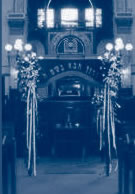|
SEDRA : KI TAVO Hertz Chumash p. 859 Deuteronomy
Chap. 26 verse 19
This week's Sedra is generously sponsored by Reuben Glass.
SYNOPSIS:
Moses concludes the legal section of his discourse with an
account of the ceremonies to be performed in the Promised
Land involving the Bikurim, the first fruits of the seven
Minim (Species). These were to be brought to the Kohen in
the central Sanctuary. The donor was then to recite a prayer
of thanksgiving, recalling how G-d had delivered his ancestors
from Egypt and brought the new generation into a land flowing
with milk and honey.
The Ma'aser (Tenth of the Crop) of each third year of the
Shemittah cycle was to be given to the poor. After this, the
donor was to offer a prayer in which he declared that he had
obeyed the commandment to set aside Ma'aser for the Levi,
orphan and widow.
Moses and the Elders instructed the people to observe several
solemn ceremonies once they had crossed the Jordan River.
Firstly, they were to erect large stones on Mount Eval, and
clearly inscribe on them all the words of the Law. Secondly,
they were to build an altar of stones and sacrifice burnt-offerings
and peace-offerings on it. The sacrificial meal which followed
the latter was to be eaten in an atmosphere of rejoicing.
Thirdly, the acceptance of the Law was to be ratified by the
twelve tribes in the following manner: Six tribes were to
stand upon Mount Gerizim, representing the blessings, while
the remaining six tribes were to stand upon Mount Eval, signifying
the curses. The Levi'im were to stand in the valley midway
between the mountains and were to pronounce curses upon those
who committed the following sins, and blessings upon those
who avoided them :
Idolatry; Dishonouring one's parents; Removing a neighbour's
boundary line; Misleading the blind; Acting unjustly towards
the stranger, orphan, and widow; Behaving in a immoral fashion;
Murdering someone in secret; Taking a bribe to give false
testimony in a case involving capital punishment; Failing
to observe the commandments in general.
All members of the twelve tribes were to respond to each
curse and blessing with the refrain of "Amen" (Truth).
The people had frequently been warned of the consequences
of disobeying G-d's law. Now that they were about to enter
the Promised Land, Moses felt it his duty to place even greater
emphasis upon the results their future behaviour would bring.
If the Israelites observed G-d's commandments, they would
receive numerous blessings. These would include prosperity
from the fields and within their cities, abundant livestock,
the subjugation of enemies, and supremacy over other nations.
The alternative would lead to disaster; disease, famine, and
death would result. The land of the Israelites would be overrun
by a cruel nation. The Jews would be scattered throughout
the world and they would once again become slaves and fugitives.
Moses then begins his third and final discourse to the people.
He appeals to them to remember G-d, their G-d, who watched
over them in Egypt, during their wanderings in the wilderness,
and who would continue to protect them in the future.
HAPHTORAH HERTZ CHUMASH P 874 Isaiah Chap 60 verse 1
This is the sixth of the Seven Haphtorot of comfort taken
from the prophecies of Isaiah. It speaks of the glories which
will attend the restoration of Jerusalem following the Redemption.
TELL ME RABBI ...... NAMING OUR CHILDREN
Naming a baby has serious implications. It expresses the
hopes and aspirations of the parents for their child. Naming
of children is given high priority in the Bible with countless
examples of the reasons for the name given a child.
At the same time the Bible provides a fertile source for the
names of our children. Jacob in his final days prayerfully
urges and blesses his grandchildren "...and call them
my name and the names of my forefathers..."
A person's name can determine their destiny (Talmud) and the
change of a name strongly registers a prayer to Heaven. The
concept of a name is inextricably bound up with the essence
of the person and their soul which is why we seek to have
that name perpetuated as in the law of the levirate marriage.
We usually try to use the name of a person whom we would
want our child to emulate. Therefore we shy away from Biblical
names of people considered evil, such as Pharaoh or Haman.
The Ashkenazi tradition is to name the child after deceased
ancestors as a memorial to them. In some communities strict
protocol existed as to which children should be named after
the maternal or paternal side. Sephardi tradition often names
children after living individuals.
The Talmud is a rich source of names and may lead one to
imagine that the child hails from a scholarly family. Non
Jewish names have also crept into Jewish usage. The name Alexander
was a compliment to Alexander the Great for the unusual circumstances
which led to him not having invaded Israel, also the Hellenistic
period left us with names like Antigonus etc. Other names
such as Gronam from Geronimus etc have also wended their way
into Jewish life in one way or another as well as names based
on Greek gods or other cultural influences such as Feibush
etc. Then there was the growth of Yiddish names such as Mendel
or Masha. The tendency in Europe was also to have double names
with Yiddish/German and Hebrew equivalents such as Menachem-
Mendel, Hirsh- Zvi, or Naphtali Hirsh Zvi, Zeev- Volf or Velvel
etc The Sephardim have maintained a somewhat purer tradition
closer to Hebrew names.
There is a modern tendency, especially in Israel, to choose
some of the more 'obscure' Biblical names such as Nimrod etc.
which raises the eyebrows in more traditional circles for
the name is based on the root meaning rebellious and Nimrod
is not well regarded in Jewish tradition. Other developments
are the invention of new names and the use of names referring
to aspects of nature as well as other picturesque verbs and
nouns with human ingenuity being the only limitation.
In more recent centuries in the diasporah the tendency has
grown to have a secular and a Hebrew name. This has given
rise some weird results such as children being named Jonathan
(a Biblical name) while their Hebrew name is....David. Ideally,
a name of obvious Jewish origin should serve for all purposes
as a sign of Jewish pride and self esteem.
Hebrew names are crucially important for life cycle event
such as for a brit, for marriage, for divorce and for burial
also for being called to the Torah and for blessings and prayers
for our health.
More important than any other consideration, are the moral
and ethical considerations arising out of the verse "good
name is better than precious balm". The inestimable worth
of a person's good name is irreplaceable and plays an enormous
part in the building of one's own self esteem and feelings
about our own worth.
BACK TO SHABBAT SHALOM
TABLE
|








